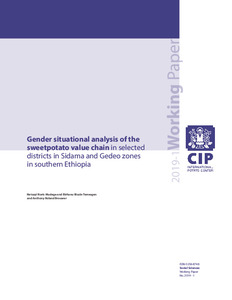Improving food and nutrition security through the introduction of more nutritious orangefleshed sweetpotato (OFSP) cultivars requires full understanding of the sweetpotato value chain, from seed production to root sales in local and urban markets. This study was conducted to understand how gender norms, roles and institutional contexts along the value chain influence the ability of men and women to participate and benefit from the sweetpotato value chain. Funded by the European Union, the study was implemented by the International Potato Center (CIP) as part of the “Quality Diets for Better Health” (QDBH) project in the Sidama and Gedeo Zones of the Southern Nations, Nationalities and Peoples’ Region (SNNPR) in Ethiopia. Qualitative data was collected from 16 focus group discussions (eight with men and eight with women) and 61 in-depth individual interviews (39 with women) along the chain.
Gender situational analysis of the sweetpotato value chain in selected districts in Sidama and Gedeo Zones in southern Ethiopia.
Citation: Mudege, N.N., Temesgen, B.B., Brouwer, A.R. 2019. Gender situational analysis of the sweetpotato value chain in selected districts in Sidama and Gedeo Zones in southern Ethiopia. Lima: Perú. International Potato Center. 111 p. Social Sciences Working Paper No. 2019-1.
2019-12-18
FOOD SECURITY, GENDER, NUTRITION, SWEETPOTATO AGRI-FOOD SYSTEMS, SWEETPOTATOES
Africa, Eastern Africa
Ethiopia
working_paper

